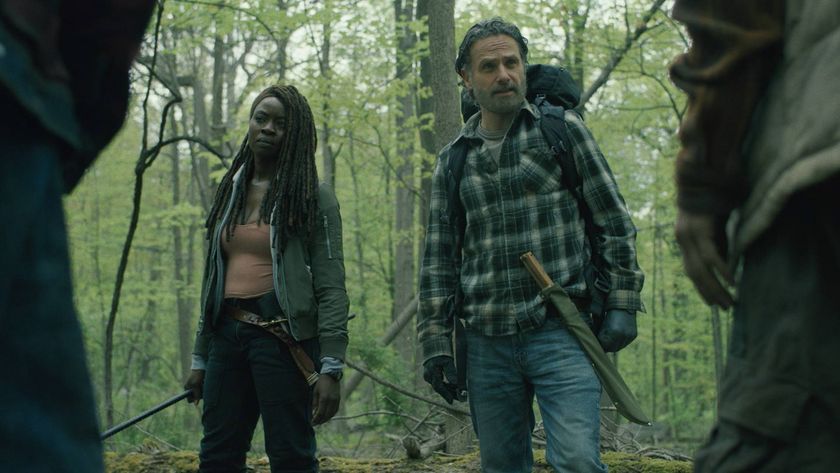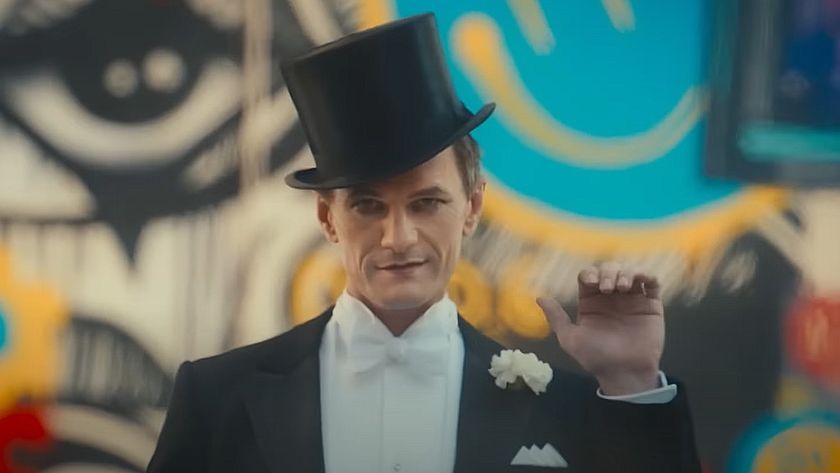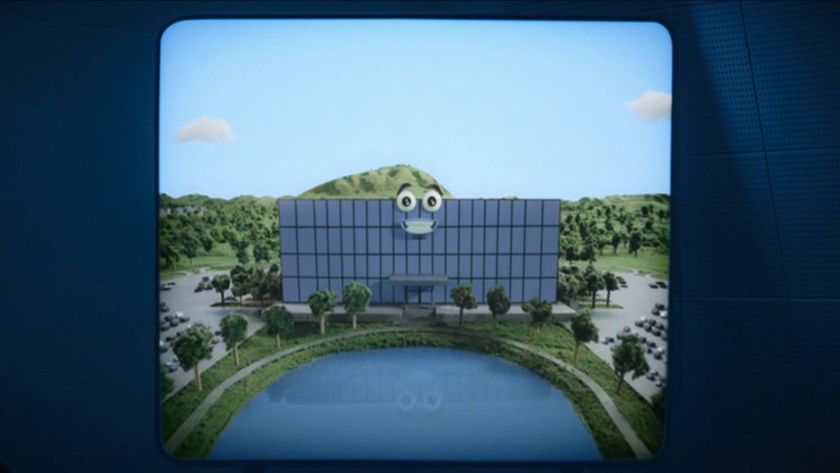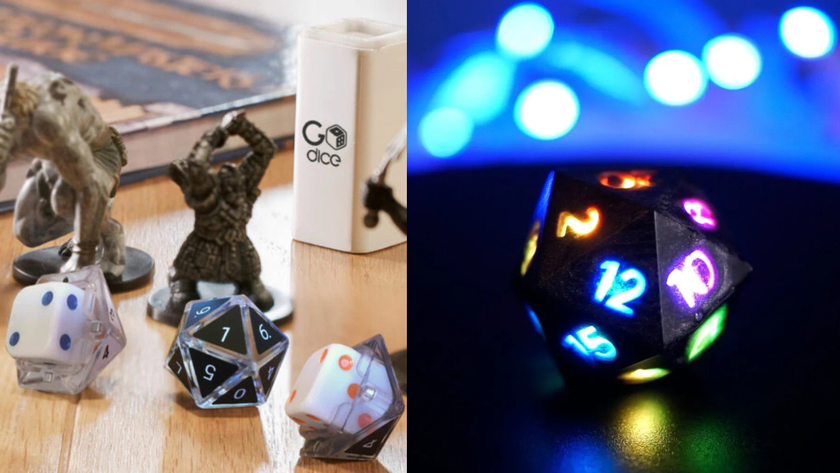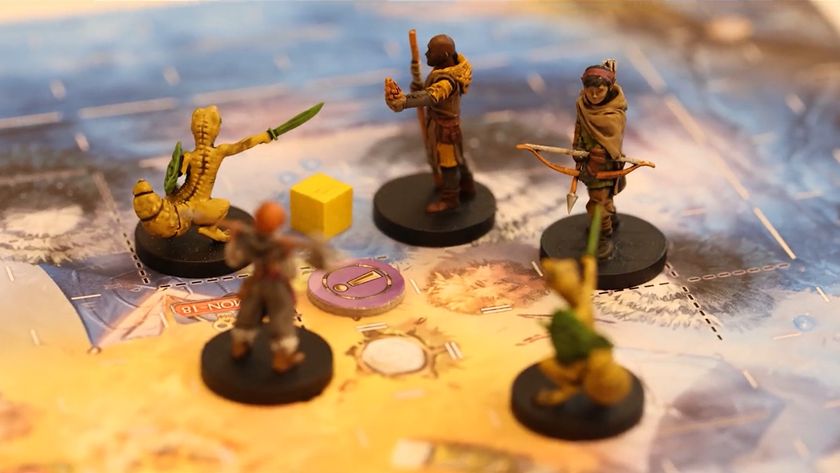M Night Shyamalan's alien-invasion mystery disappointed many people who probably weren't expecting it to be two things: a family drama and a spiritual journey. Jayne Nelson takes to the courtroom to explain why Signs is a much-maligned, heartfelt masterpiece which doesn't deserve the bad press...
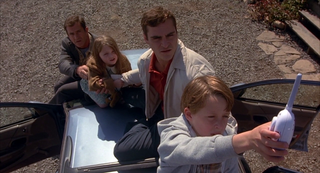
Case for the prosecution: Ladies and gentlemen of the court, we'll start by saying something nice, even though we are the prosecution and we don't usually do things like that. The nice thing we want to say is this...
Once upon a time, we loved M Night Shyamalan. Back in the days of The Sixth Sense and Unbreakable , those six syllables would launch a little tingle down your spine, a tingle associated with a brand-new master filmmaker who seemed perfectly plugged into the SFX psyche. His films were unusual. They were effortlessly dramatic. They were emotional. Most of all, they were fresh.
And then along came Signs and it was the start of the downward spiral that leaves us with the Shyamalan we know today; the filmmaker who brought us The Happening (not-so-happening, actually) and The Last Airbender (let us not speak of this film again).
Signs is where it all started going wrong for both him and us, because Signs is a truly awful movie.
Case for the defence: While the defence appreciates its learned colleague being nice for once...
Case for the prosecution: Don't get used to it!
Sign up to the SFX Newsletter
Get sneak previews, exclusive competitions and details of special events each month!
Case for the defence: ...We do feel that we have to protest at the second half of their opening statement. Signs is not, by any stretch of the imagination, a truly awful movie. It's a deeply spiritual drama that deserves reassessment. And a clever analogy for the way a director is the “god” of his film. Like Don’t Look Now , it’s as much a film about filmmaking as it is about aliens.
Case for the prosecution: A film designed for film studies courses…? Dear Lord, our case should rest there.
Case for the defence: Hardly. Such elements are the subtle icing on a truly extraordinary cake.
Case for the defence: And your point is?
Case for the prosecution: It was a poster campaign that promised mystery, but the film that turned up was a soppy family drama with an alien invasion tacked on the end. Such a let-down!
Case for the defence: Okay, so here's the thing. Shyamalan, as we all know from The Sixth Sense , is all about the build-up. He wrote about crop circles left in fields around the world which signal to the human race that something unknown is coming – how is that not a fantastic idea? Then you take an ordinary American family living on a farm and you plant one of those things in their field. Throw in the wind rustling through the greenery, the fear of the unknown out there among the stalks, and you watch the tension build. Perfect drama.
Case for the prosecution: But the pay-off doesn't work! The film loses its way as soon as the aliens turn up. It goes from something enigmatic and unknown to something we've all seen a million times before – men in rubber suits!
Case for the defence: There's nothing wrong with a man in a rubber suit. Alien’s Xenomorph was one, you know.
Case for the prosecution: That's in a different league to this codswallop.
Case for the defence: This is a different film, yes. Signs isn't supposed to be horror, even though there are quite a few scares: the alien that strides past a kids’ party, or the bit with the fingers and the door. The aliens are really nothing more than the catalyst for Mel Gibson's disillusioned priest to find his faith again after the death of his wife.
Case for the prosecution: In that case, why didn't Shyamalan just write a movie-of-the-week about overcoming loss and forget about the aliens?
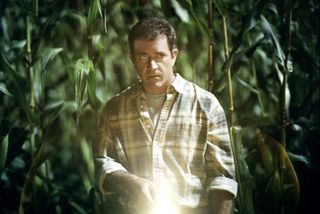
Case for the defence: Because why should a story be one thing or another? Why not combine two genres? A grieving priest's home is invaded by aliens and while protecting his family he realises he's found evidence of God – the last thing his wife said to him, about swinging a baseball bat, was exactly the advice his family needed to defeat the aliens. It's a sign , see? The film's title applies to more than one thing. Plus there's the delicious irony that ALIENS make a man believe in God again. Aliens! Of all things! It's exquisite writing.
Case for the prosecution: But why do we care about him and his stupid kids when we could be watching aliens blasting the hell out of planet Earth? Why not just go all-out?
Case for the defence: Count up all the films in which we get to see aliens blasting the hell out of planet Earth. Now count the ones in which we see it all from one family's perspective in their home. Notice how the former outweigh the latter? Sometimes, less is more. You learn to care about each member of that family far more than you care about, say, the citizens of New York being raygunned from the sky en masse .
Case for the prosecution: Mel Gibson’s one thing we don't mind watching – or he was before his public meltdowns, anyway. But who wants to see kids? That was a bad call. Snotty-nosed sprogs have ruined a million alien invasion movies.
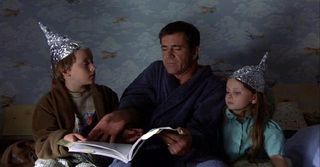
Case for the defence: But Signs has an advantage: its kids can act. Rory Culkin and Abigail Breslin are (or were) among the best child actors we've seen in years. Breslin's little Bo is probably the best child performance since Drew Barrymore in ET .
Case for the prosecution: Alright, so perhaps we're being a bit mean to the children. But one person we can be mean about is Shyamalan. Why is he in this movie? Why can't he ever seem to write a film without putting himself in it? As a character in Supernatural once said, writing yourself into your own story is “M Night-level douchiness”.
Case for the defence: Why not? Quentin Tarantino does it. Also, only a small percentage of the audience are going to know what he looks like, so why is it an issue?
Case for the prosecution: Because the percentage of us who do know what he looks like get distracted when we see him! And in Signs , it's during the scene in which Gibson's wife dies, so it massively undermines that scene!
Case for the defence: But it’s not just a self-indulgence or an in-joke. In a film about faith, Shyamalan is alluding to the French New Wave cinema theory of the director as God. He appears himself because he is the director , so it’s no coincidence he plays the man, Ray Reddy, who caused Gibson’s character’s wife’s death. He’s highlighting that – as writer/director – he controls the fate of these characters. Ray, notably, is also the first character to mention that the aliens are allergic to water, and he’s the one who traps one in the pantry. Ray – like Shyamalan – is driving the plot, and setting up the ending. That’s why he’s in the film.
Case for the prosecution: Ah, we see. He’s in the film because he’s a pretentious little oik.
For our closing argument, we present Signs ' biggest issue, the one problem that most people were complaining about after walking out of the cinema...
Case for the defence: Oh, here it comes…
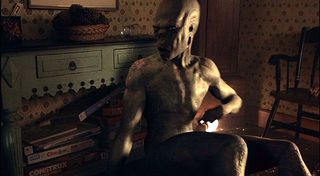
Case for the prosecution: In short – the aliens who invaded Earth were allergic to water. So why the hell did they invade a planet that's two thirds water? It makes no sense!
Case for the defence: Yup, we knew you were going to bring up this ridiculous argument. Because that’s what it is – ridiculous.
Case for the prosecution: Defend that plot point. We dare you.
Case for the defence: Challenge accepted. First up: if you're going to get in a spaceship and travel for millions, maybe billions of miles across space to invade a planet, you're not going to do it for a lark. Clearly they didn't want our water because they're allergic to it, so they must have come for food instead. This means that they were hungry, maybe even starving. Aliens invade planets because they have to , not because they're on a jolly ( Mars Attacks aside, natch).
If said planet contains substances poisonous to them, then they have to work around them because they have no choice . You'll note that all the crop circles designating alien landing points in the film are in dry places away from lakes and seas. They didn't just blunder willy nilly onto our planet and hoped they didn't step in a puddle!
Protesting, as many people have done about Signs , that the aliens wouldn't have invaded Earth in the first place because bits of Earth are dangerous to them is like saying that we, as a race, would never have invented scuba-diving because we can't breathe underwater. Or that we'd never have gone into space because there's no air, or ridden on a skateboard because they go to fast, or sat at the top of a slide because the fall could break our necks. Assuming that these aliens should have been scaredy-cats is lazy, pointless nit-picking. They needed food; they came to Earth to get it; they found it. The food was probably us – there are seven billion of us, after all. The fact that the food fought back is the whole point of the film.
Case for the prosecution: Okay, that’s a valid point. Perhaps they were hungry. But going to so much risk to round up a few humans for lunch? Still intrinsically ridiculous. The danger far outweighs the reward.
Case for the defence: Look around you. Every single day people climb into flimsy fishing vessels and risk their lives on the ocean catching fish that they often don't need to eat, because they have plenty of alternatives. Here's another example of people doing dangerous things to get hold of food:
Why do they do this? Money. Who's to say the aliens weren't collecting humans for dosh? Humans die every day collecting food – it's a fact of life. It's probably a fact of these aliens' lives, too. And we repeat: they didn't land in the sea. They sent out raiding parties on land. They weren't stupid!
Case for the prosecution: But the Hess family fought them off with cups of water! Why didn't the aliens wear protective suits, for Pete's sake?
Case for the defence: The aliens would naturally assume that humans were too stupid to know they were allergic to water. In the same way that we, as humans, assume that animals are too stupid to know some of us are allergic to them. If cats knew we had allergies, for example, imagine how many of them would rub their fur in our eyes at the first opportunity!

Case for the prosecution: Alright. So what if it rained ?
Case for the defence: Maybe they brought brollies?
Case for the prosecution: So you're essentially saying that we should accept the fact that these aliens travelled all the way here and were repelled by a few cups of water because it's the kind of dumb thing us humans would do ourselves?
Case for the defence: Yes. If they were omnipotent, all-powerful aliens, they'd be less believable than the ones we actually got.
Case for the prosecution: We're still not convinced. Syrupy writing, faux spiritualism and dumb aliens do not a convincing film make.
Case for the defence: So you would have preferred it if Signs had blown up the White House, levelled New York and ignored a small family in Pennsylvania entirely?
Case for the prosecution: Yes.
Case for the defence: Go watch Independence Day , then, and stop wasting the court's time. Case closed.
Check out our other Isn’t It About Time features
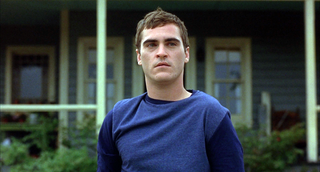
SFX Magazine is the world's number one sci-fi, fantasy, and horror magazine published by Future PLC. Established in 1995, SFX Magazine prides itself on writing for its fans, welcoming geeks, collectors, and aficionados into its readership for over 25 years. Covering films, TV shows, books, comics, games, merch, and more, SFX Magazine is published every month. If you love it, chances are we do too and you'll find it in SFX.


